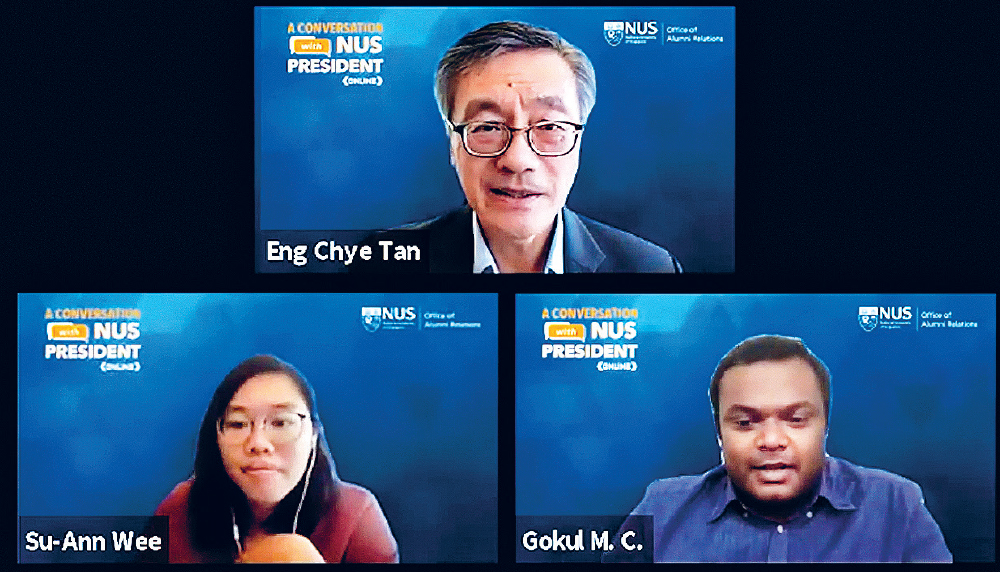Nurturing a Forward-Looking University
Attendees of the session were given insights into the University’s latest plans, initiatives and developments that encourage lifelong learning.

Over 150 alumni, students and staff joined A Conversation with NUS President Professor Tan Eng Chye (Science ’85) to keep abreast of the University’s evolving education model and framework that aim to prepare graduates to be tomorrow’s leaders.
Today’s fast-changing landscape sees growing expectations for adept, multifaceted talents who can stay ahead of the curve. On 14 July, like-minded members of the NUS community tuned in for an enriching session via Zoom to hear about what the University has to offer to meet this challenge. The virtual conversation was led by a panel featuring Prof Tan, NUS Students’ Union (NUSSU) President Ms Wee Su-Ann (Law ’21) and Graduate Students’ Society (GSS) President Mr Gokul M. C. (Engineering, PhD).
In an hour well spent, attendees of the session were given insights into the University’s latest plans, initiatives and developments that encourage lifelong learning. Prof Tan shared about the learning priorities of the University, which dictate an interdisciplinary approach and broad-based learning. This effort has been supported by the introduction of the College of Humanities and Sciences (CHS) last December, an enhanced undergraduate experience for students of the Faculty of Arts and Social Sciences (FASS) and the Faculty of Science (FoS). CHS will equip students with relevant skills to develop competencies across fields as the curriculum shifts from the previously singular or multidisciplinary studies to a flexible and interdisciplinary one.
In line with the strategy to scale up interdisciplinary teaching and learning at NUS, Prof Tan also revealed upcoming plans to merge the Faculty of Engineering (FoE) and the School of Design and Environment (SDE). As part of NUS’ lifelong learning philosophy, a future-ready approach will equip graduates with the necessary skillset to thrive in a world of accelerated changes. Framed as a 20-year commitment, the University’s new education model was also detailed.
Following Prof Tan’s informative 30-minute sharing, an interactive Q&A was held to take questions from the floor. Attendees enjoyed an invigorating exchange with Prof Tan, Ms Wee and Mr Gokul as they discussed NUS’ commitment to mature into a global university that empowers future leaders.
“Lifelong learning has to be a key capability of our graduates. As new things get introduced, they cannot just rely on their four years of university education to last them for the next 30 to 40 years of working life. With rapid changes and disruptions in industries, we have to imbue our graduates with a capacity to learn as they continue to pivot and specialise in different areas. Interdisciplinarity allows this agility to embrace change,” said Prof Tan.
 NUS President Professor Tan Eng Chye, NUSSU President Ms Wee Su-Ann, and GSS President Mr Gokul M. C.
NUS President Professor Tan Eng Chye, NUSSU President Ms Wee Su-Ann, and GSS President Mr Gokul M. C.
An excerpt of Prof Tan’s response to questions raised during the session.
Will interdisciplinarity be encouraged in more advanced modules? How has the teaching faculty been pushed to adopt interdisciplinarity in their modules, given the traditional silos between departments?
The approach is to provide a broad intellectual foundation to all students, which will prepare them to continue learning and re-pivot every few years to meet the fast-changing industry requirements. Faculties understand the value of collaboration and the benefits it brings to our students. For instance, within NUS’ Department of Communications and New Media (CNM), a curriculum review has been ongoing since 2017 to reflect rapid changes in media, including the rise of ubiquitous computing and AI, the datafication of society and culture, and the digitalisation of markets. The close collaboration between FoE and SDE also involves SDE colleagues contributing to new common modules in design thinking, project management and liveable cities, while FoE colleagues provide modules that teach AI/machine learning and digitalisation, and prototyping.
Will there be more faculty exchanges (e.g. Medicine/Nursing with FASS) in the upcoming years to prepare students to be global thinkers who go beyond grade performance?
As a start, our initial implementation of interdisciplinary education already involves the four main faculties (Arts and Social Sciences, Science, Engineering, and Design and Environment), which account for two-thirds of NUS’ undergraduate enrolment. Moving forward, we have plans to reform legal education in response to changes in the profession, in particular, combining legal skills with technological and business sensibilities. We will also reimagine health sciences education to better prepare graduates in medicine, dentistry, nursing, pharmacy and public health for work amid transformative shifts in the healthcare ecosystem and the dramatic changes taking place as the population ages. NUS Business School will be adopting a new grading system in the new semester which will be implemented for Master-level students, enabling them to focus on the learning instead of stressing over assessments, and to be bolder in exploring new topics and building a more collaborative learning culture. To encourage learning and discovery, NUS also introduced the grade-free first year for all undergraduates in 2016.
![]()
With rapid changes and disruptions in industries, we have to imbue our graduates with a capacity to learn as they continue to pivot and specialise in different areas. Interdisciplinarity allows this agility to embrace change.
Professor Tan Eng Chye, NUS President
Besides the Graduate Research Innovation Programme (GRIP), does the University’s curriculum provide development for students to imbue the entrepreneurial mindset?
Besides GRIP, NUS also provides opportunities for entrepreneurial development through the NUS Overseas Colleges (NOC) programme and the Minimal Viable Product (MVP) Studio. Students selected for the NOC programme will do internships in technology-based start-ups in the world’s leading entrepreneurial hubs and take classes at reputable foreign universities. The MVP Studio by NUS Industry Liaison Office was established to create commercially-focused prototypes of NUS technologies built by teams of apprentices under the guidance of Master Engineers.